Jesus says to us today, “Put your finger here and see my hands, and bring your hand and put it into my side.”
And my first reaction to that is: yuck.
Yuck!
Why would I want to put my fingers into the wounds on the body of the Lord?
The answer is: I need to. I need to touch and believe. I need to taste and see (Ps 34).
And God knows that I have that need.
Jesus is an incarnate Lord. He came to us in the flesh. He came to us as a man, so that we could know Him intimately. And He died for us in the flesh so that we would be freed from sin.
Jesus wants, and He has always wanted, to “take us to heaven to live with Him there.” But we are doubting Thomases, we are a stiff-necked people, we are sons of Adam and daughters of Eve. So He tries over and over again to help us to see Him and believe. And only then can we follow Him.
“I saw the tomb of my holy Lord, and saw Christ risen and adored.” That’s what Mary Magdalene says in the English version of the Easter Sequence, that ancient poem that begins, “Christians praise the paschal victim” (11th c.).
She saw, and she believed; she saw, and she adored.
But astute readers are probably already thinking: he’s falling into a trap with all that stuff about seeing and believing…
Because we heard in the Gospel that Jesus tells Thomas: “Blessed are those who have not seen and have believed.”
I think a lot of preachers this Sunday will focus on that line.
And they’ll say, “see, you may think you’re not as lucky as the Apostles, because they got to spend time on earth with Jesus and you’re stuck here. But you should be glad, because here you see that you are actually more blessed than they were.” I know I have heard that homily dozens of times.
I suppose you have, too.
But how much does it help us to say: “Well, I’m doing pretty good. I haven’t seen, sure, but I believe. And Jesus says that’s alright. So I’m all set.”?
I want to suggest to you that that’s not what Jesus means today.
And I want you to consider, just to think with me, whether it is really true that we are people who haven’t seen.
Have we not seen the Lord?
Because a lot of the time our problem – and this might seem a little controversial – our problem is not that we haven’t seen but that we will not see. We look everywhere, but not at Jesus. We will not see — we refuse to see — we avoid seeing the Lord.
What do I mean?
Well, have you noticed what the Church has been doing for us since Easter Sunday? The Church knows that in order to teach us about the mystery of Easter, in order to teach us about the glorious resurrection of our Lord Jesus Christ, it’s going to take time and it’s going to take repetition.
Today is the last day of the octave of Easter. Octave means eight, eight days, in which we celebrate the same feast over and over again.
We celebrate Easter as if time stood still for more than a week. Here it is the next Sunday, and we can still say: Christ the Lord is risen today. Today. Because all the days in the octave, including this Sunday, have the same value and the same dignity as Easter itself.
Why do we have an octave? I think it’s because we need time to absorb. We need time to accept this amazing news that Christ is risen.
Sometimes we are more resistant to accepting good news than to accepting bad. And as hard as it is to stand with Jesus at the Cross on Good Friday and really allow into our hearts the devastating news that Christ has died – as awful as that is – we sometimes have a much harder time standing in front of the empty tomb, standing there in our stubbornness and our pride, and really admitting to ourselves in our hearts that Christ is risen.
It seems too good to be true.
But the Church is patient. Our Lord is patient. And we have eight days, more than a week, just to meditate over and over again on this powerful mystery.
And: how do Christians greet each other at this time of year? That’s another clue. Christians say – and we always have said – Christ is risen! and the response is, He is risen indeed.
We repeat that and repeat that; call and response. It’s almost like we are giving each other a little quiz. A little checkup: do you know what happened? Remember? Christ is risen! (Yes, He is risen indeed.)
Just like you teach a child.
Repetition: we are teaching each other step by step to accept, to believe, in the shocking truth that the Lord is not dead; He lives.
Now why are we so resistant? Why do we want to edit and correct and control God? Tell Him what He can’t do? Why do we have such a hard time standing in front of that empty tomb and saying, Hallelujah?
Here’s where we get to the mystery of Divine Mercy. Because today is not only the last day of the octave of Easter, not only the Second Sunday of Easter on the Church’s calendar, it is also, since the year 2000, officially known as Divine Mercy Sunday.
This is a special day for us in Krakow. It was “our” saint Faustina Kowalska, who died at Łagiewniki, who had the visions of Jesus and wrote the moving words that let to the devotion of divine mercy. And it was “our” bishop, the man from Wadowice, who at the start of this new millennium instituted today as Divine Mercy Sunday in the universal Church.
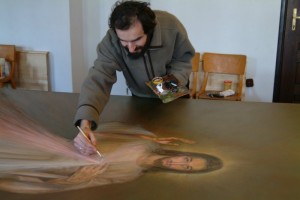
Janusz Wacław Antosz finishing a copy of the Divine Mercy image for the Dominican community at Służew in Warsaw in 2008
Pope Francis has declared this the Year of Mercy, so today is the day of mercy in a year of mercy. Today we are at a peak.
Mercy: I mentioned the thousand-year-old Easter sequence that starts “Christians praise the paschal Victim” (Victimae Paschali laudes). Do you remember how it ends? “Tu nobis Victor Rex miserere.” Miserere. (Our King, Our Victor, have mercy on us.) It ends with mercy.
And why do we need all this mercy? Well, what does the Gospel say? “Unless I put my finger into the nailmarks, I will not believe.” I will not, I will not believe.
It’s not only Thomas who says that.
We say that.
And that is because it is so hard for us to acknowledge who our Lord is and who our God is.
“My thoughts are not your thoughts; and my ways are not your ways,” says the Lord (Is 55). God is so different, so far beyond us. He is utterly other, as that Dominican Thomas – not doubting Thomas, but Saint Thomas Aquinas – taught.
God is utterly Other than his creation. (That’s what the prophets said, too.)
Our God is not some Watchmaker, who set the cosmos running but has no further connection with us. No: Thomas teaches that it is precisely because God is other, because God is unlimited by any human constraint, that God can be intimately close to us in a way no human can.
God has no bounds.
And so, as Thomas puts it, God is “innermostly” present. (Summa theologiae Ia, q. 8, art. 1, resp.) He is present in the marrow of our bones.
This is the risen Lord. This is the Jesus who came to save us.
This is the man that Mary Magdalene saw in the garden and thought was only the gardener, until she heard his voice.
This is Jesus standing before you as He stood before the Apostle Thomas and saying to you, “Put your finger here and see my hands; bring your hand and put it into my side.”
Touch Him: your sins are not too big for Him to forgive.
You don’t need to run from Him and you don’t need to hide from Him because you think that somehow He cannot have mercy on you.
(That’s absurdly vain, if you think about it: to think that your sins are so special and so powerful that they will overpower Almighty God.)
It’s time now to break a barrier.
It’s time to stick your fingers right into the flesh of Christ.
Today is a chance to encounter God in the flesh and deeper-than-flesh: to know the God who is innermost.
It’s time to accept His mercy that washes us clean as snow. It’s overwhelming.
But it is time –it’s time today — to see and to believe.












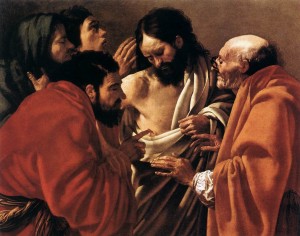
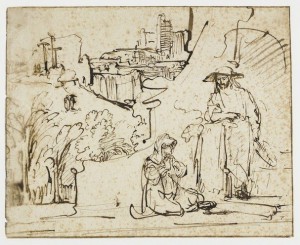
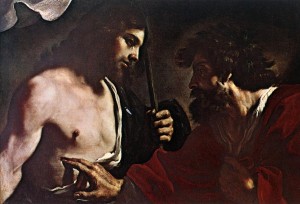

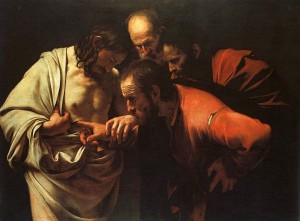
Comments - No Responses to “Touch my side”
Sorry but comments are closed at this time.